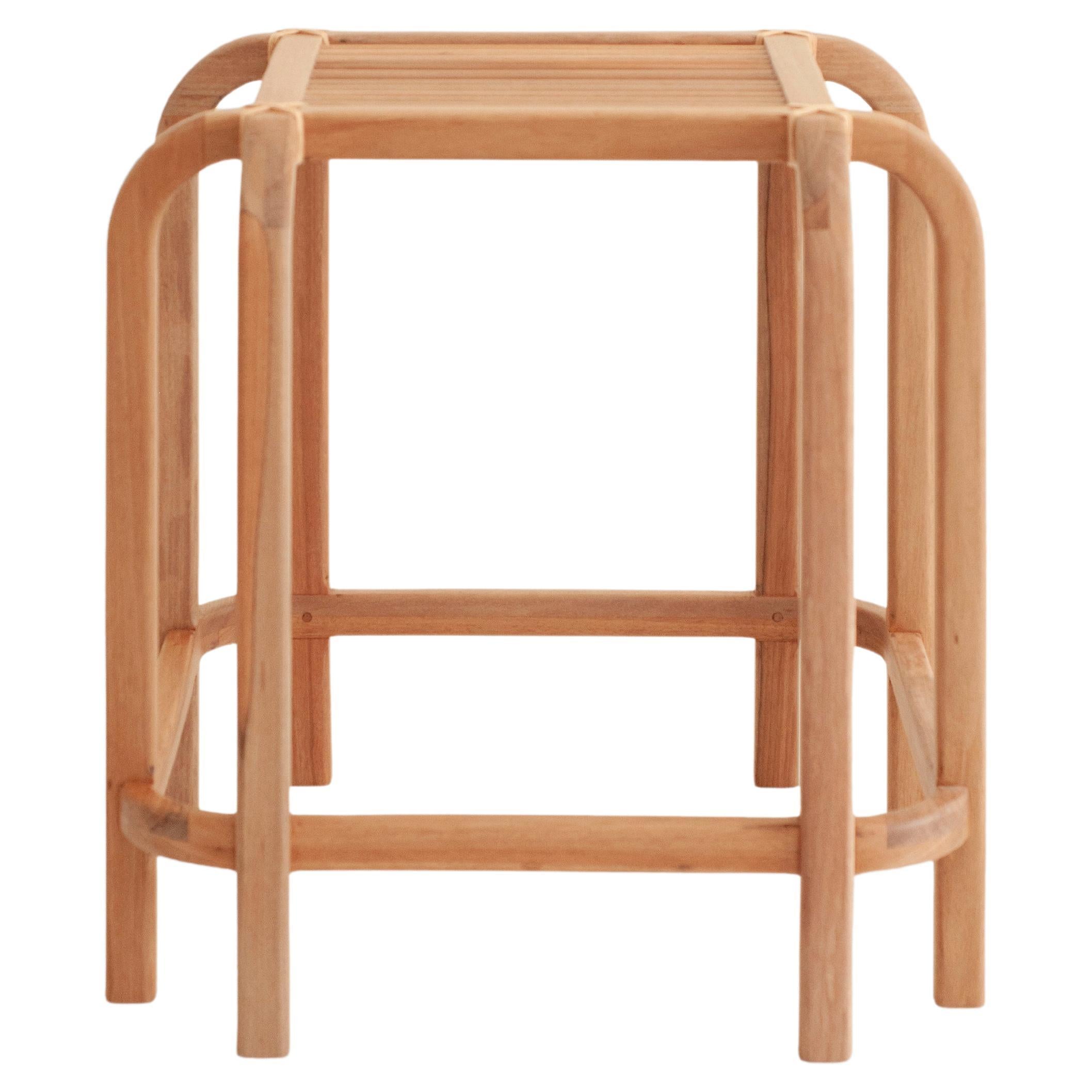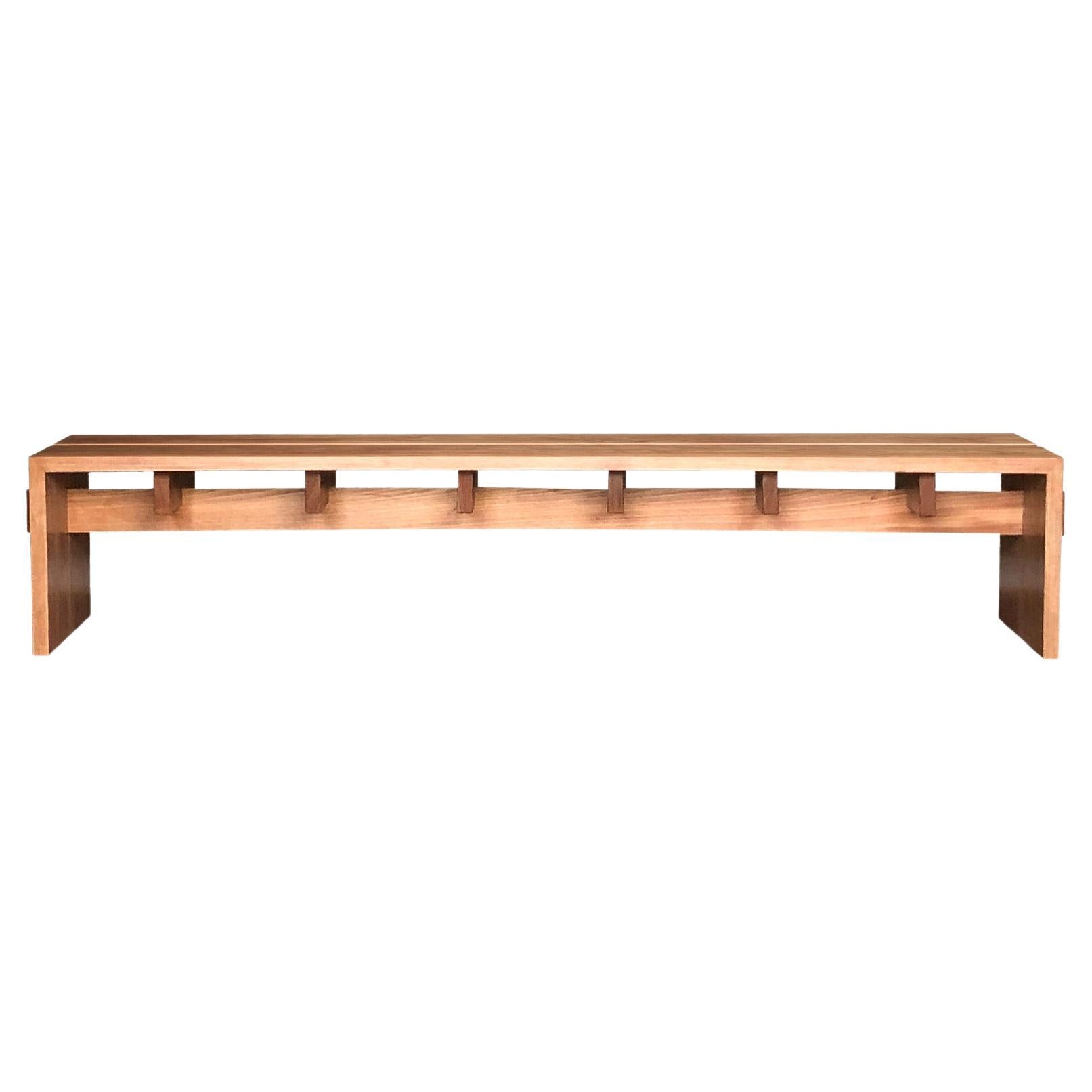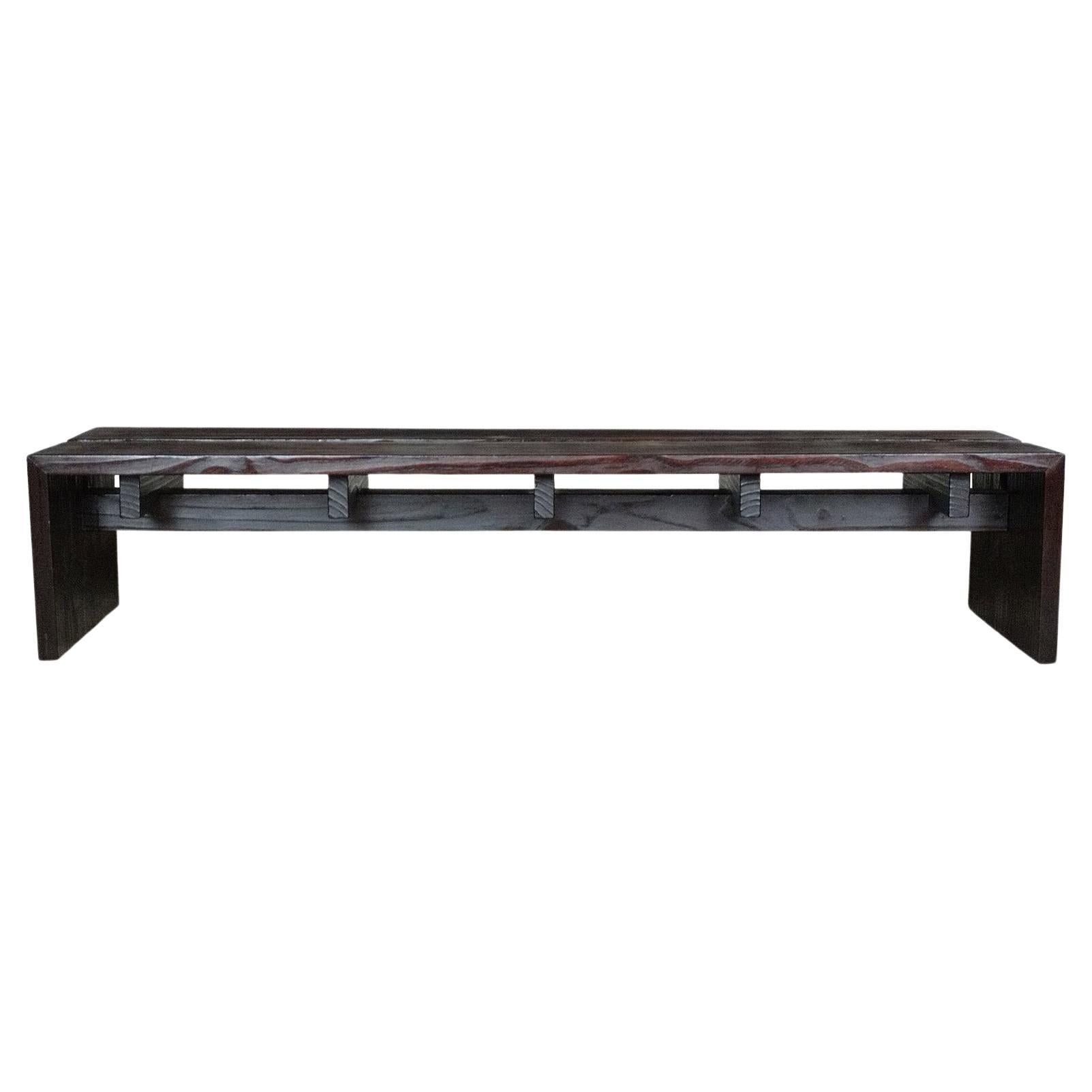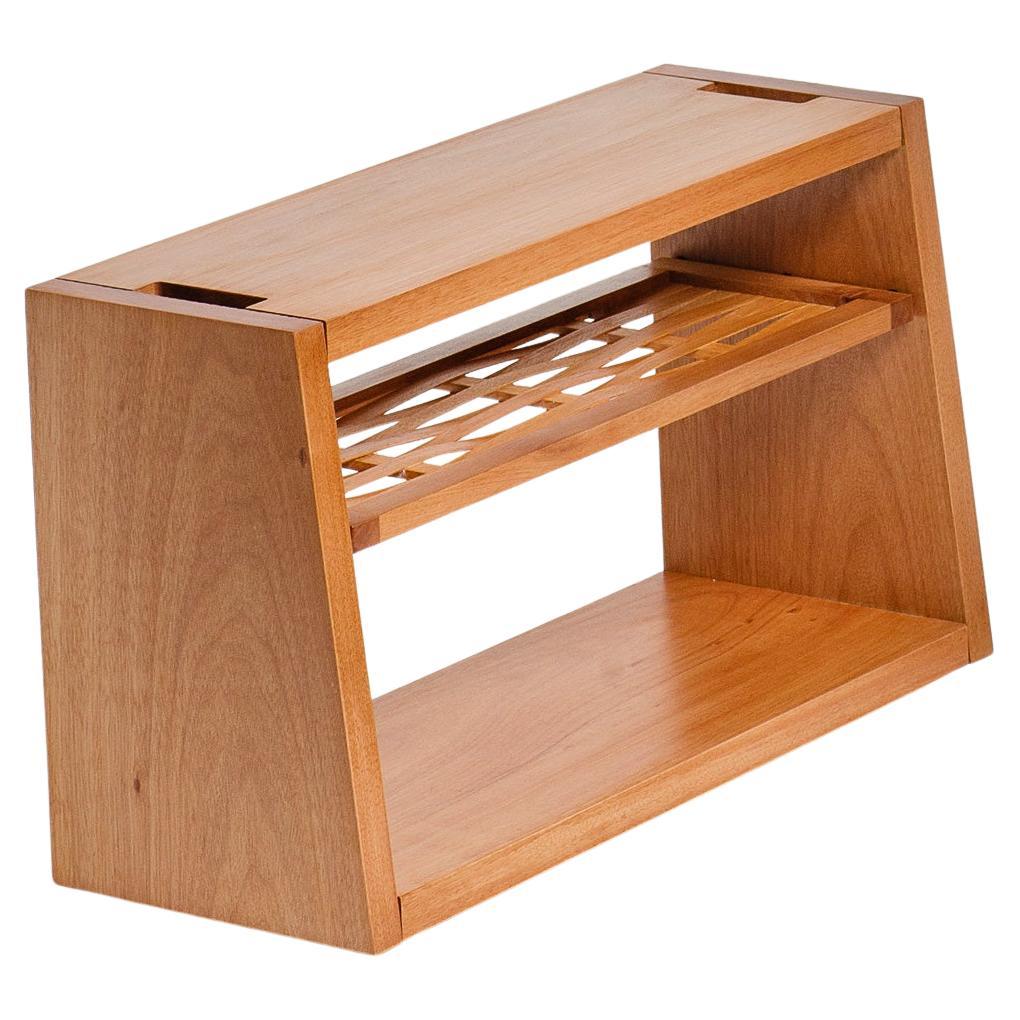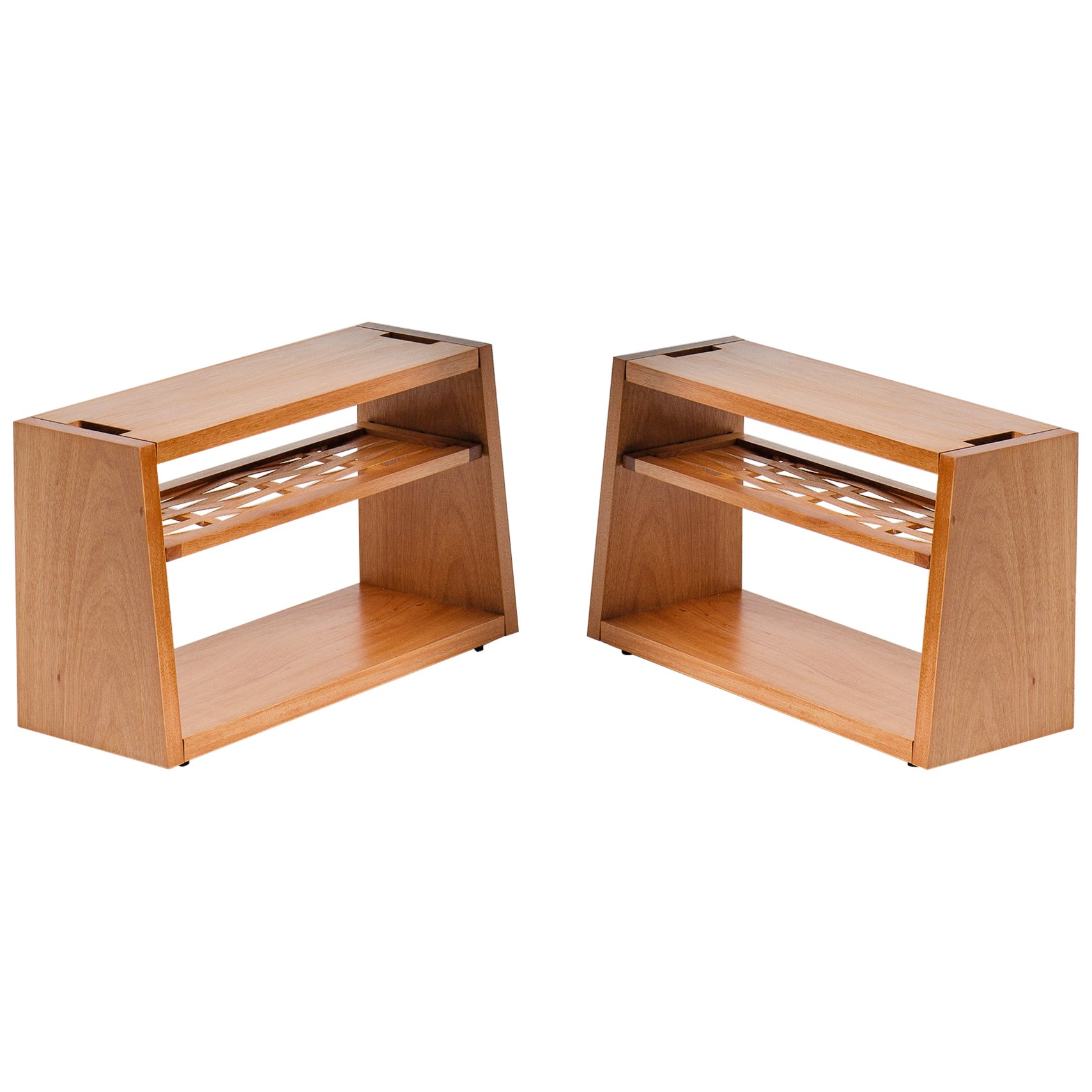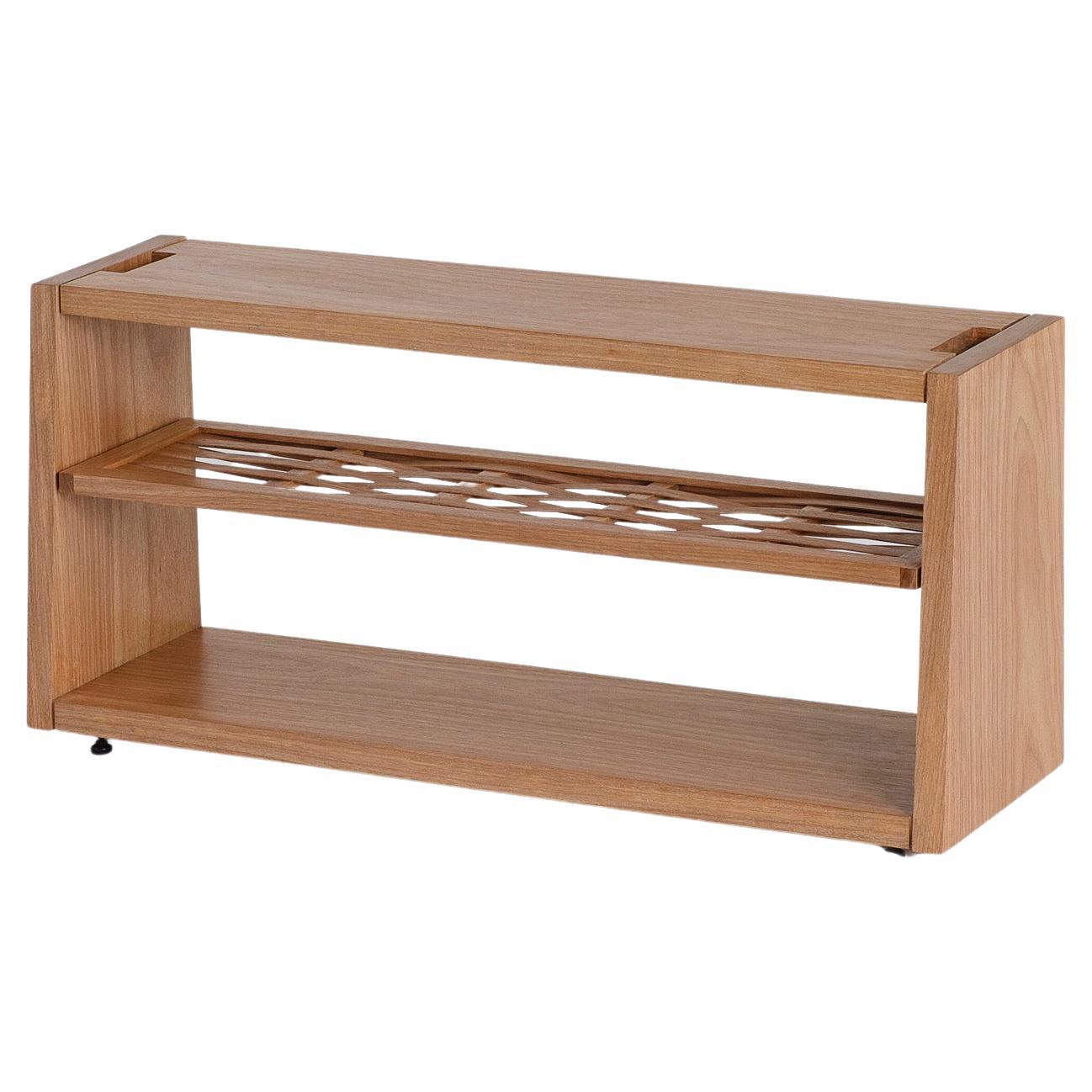Items Similar to Embira Bench: made in Brazil with pink jequitba wood and natural dyed yarns
Video Loading
Want more images or videos?
Request additional images or videos from the seller
1 of 10
Embira Bench: made in Brazil with pink jequitba wood and natural dyed yarns
About the Item
Curves and symmetry, comfort and beauty. The Embira Stool is a multifaceted piece that fits into different environments, from the most sophisticated to the coolest. Made with jequitibá wood its feet seem fragile, but support the weight of sitting. A detail that draws attention is the mooring made with cotton threads dyed with the bark of the embira’s tree, collected on the surroundings of the Kaupüna Village, in the Xingu Indigenous Territory, Mato Grosso, Brazil.
A passion for wood, symmetry, and flexibility. It is impossible not to fall in love with the structure of the “oca” (the name used to designate the Mehinaku indigenous people homes). The lightness that is counterbalanced by force is impressive.
The curvature that the pindaíba trees, thin and long, allows, the solidity found in the cinnamon wood that permeates the earth to bring security, and the incredible embira bark that unites everything, eliminating the use of nails. These are all raw materials found in the surroundings, within sight, that have only their uses reviewed, showing that it is always possible to find a new meaning for what is around us and in our life.
It is part of Yankatu's Xingu collection. To create it Maria Fernanda Paes de Barros researched the Mehinaku traditions, visited Kaupüna village for a short period of time before the pandemic and went through numerous immersions with the local artisans online.
As all the pieces produced by Yankatu, it is accompanied by its soul, a certificate of authenticity in the form of a small book that tells about the inspiration that gave birth to it and leaves blank pages so that its story can continue to be told by those who acquire it, turning it into something more, which does not change with fashion, which does not go by with time. To the contrary, it will move on from a generation to another, from hand to hand, each time with more stories to tell, each time incorporating the lives shared by it.
Developed in partnership with Mehinako artisans, in Alto Xingu, a line of products created by Maria Fernanda Paes de Barros arise from the meeting of the past and the future to build a new present.
It is amazing how vision, after immersive experiences in ancestral cultures, begins to have a greater sensitivity to see new ways of bringing our origin to the contemporary world. It is along this path that Maria Fernanda Paes de Barros, artist, researcher and founder of Yankatu, travels. With her soul absorbed by the profound experiences of the places she goes through, Maria Fernanda, in her own way, captures a dose of each learning experience, bringing to surface revelations in form of pieces filled with value, as a manifest for the benefit of Brazilian identity. “Each trip I make, I become humbler, I perceive differences from new angles, relearning to see and understand meanings through the other's place”, explains the artist.
For the new Xingu Collection, process could not be different; however, it had unusual circumstances in its development. The collection arose from the encounter between Maria Fernanda and the Mehinako ethnicity, located in the Kaupüna village, in Upper Xingu, south of Amazon Forest, at the end of last year. “Xingu is born from an encounter between past and future, but is established in the present, proposing new ways of looking at tradition, with the respect and admiration that it deserves, while using technology to maintain communication in times of isolation ”, says Maria Fernanda, who, due to new practices since the beginning of pandemic in the world, was unable to return to Kaupüna village to continue the studies and production process.
This unprecedented protocol in the dynamics made Maria Fernanda find new ways of interacting with the village artisans. The weaving techniques classes that she would have in loco were transformed into recorded videos and sent over the internet; with the help of Kulikyrda Mehinako, an artist and one of the community representatives, Maria Fernanda developed a new color chart, extracted from leaves and barks of native trees found in the reserve, with the aim of rescuing the full potential of Xingu, counting on Maibe Maroccolo, in Brasília, to extract these shades and make dye pigments to color the cotton threads used on the mats produced by the Kaupüna village’s women.
To develop the pieces of the collection, Maria Fernanda was inspired by the objects and everyday elements of Mehinaku people.
Prizes:
2022 - Créateurs Design Awards - Best Design Collection Nominee
- Creator:Maria Fernanda Paes de Barros (Designer)
- Dimensions:Height: 17.72 in (45 cm)Width: 55.12 in (140 cm)Depth: 29.53 in (75 cm)Seat Height: 17.72 in (45 cm)
- Style:Other (In the Style Of)
- Materials and Techniques:
- Place of Origin:
- Period:
- Date of Manufacture:2020
- Production Type:New & Custom(Limited Edition)
- Estimated Production Time:Available Now
- Condition:
- Seller Location:Jundiaí, BR
- Reference Number:1stDibs: LU3188122164502
Yankatu - design with soul
My motivation comes from my soul and flows openly, on my life and in my work. I love what I do and I do it with intensity, I live every moment and I transmit all this emotion. In each project I immerse myself deeply in the region, in their craft and in the lives of the people who make them, it is a dive governed by research and by my soul, guided by the heart, done with respect and with the rhythm dictated by time. I get transformed and provoke transformations, and these atitudes reflect in the surroundings and beyond. I believe that design and art are one of the ways to value and eternalize the ancestral knowledge of Brazilian traditional crafts and the importance of nature around us, and so I use all tools that I have to create a quilt of infinite possibilities, full of feelings. Through Yankatu I expose not only my work, I bring with me the dreams and works of the artisans and instigate new dreams too. The tangible part of this work are the pieces that intertwine my touch with the lives that share their moments with me. The other part, immeasurable, is in continuous development, in a mixture of art and freedom, with no date to finish. It is a continuous development, in a relationship created around respect and trust. My desire, to be able to do this as long as I live.
About the Seller
No Reviews Yet
Vetted Seller
These experienced sellers undergo a comprehensive evaluation by our team of in-house experts.
Established in 2015
1stDibs seller since 2017
17 sales on 1stDibs
- ShippingRetrieving quote...Ships From: Jundiaí, Brazil
- Return PolicyThis item cannot be returned.
More From This SellerView All
- Embira High Stool: made in Brazil with pink jequitba wood and natural dyed yarnsBy Maria Fernanda Paes de BarrosLocated in Jundiaí, SPCurves and symmetry, comfort and beauty. The Embira Stool is a multifaceted piece that fits into different environments, from the most sophisticated to the coolest. Made with jequit...Category
2010s Brazilian Other Stools
MaterialsHardwood, Natural Fiber, Wood, Cotton
- Reliquary Mirror: made in Brazil with imbuia wood and bronze mirrorBy Maria Fernanda Paes de BarrosLocated in Jundiaí, SPEntirely made of solid imbuia and 4mm bronze mirror, the Reliquary Mirror it's a collectible design piece. Leaning on the table or installed on the wall, this piece attracts attention and can be placed in different spaces, as the entrance hall or as a support on the dressing table, decorating the wall in the living room or on the counter in the social bathroom. The effect of light and shadow created by natural light is captured by the delicate design that runs through the wood and allows a glimpse of the hidden mirror. Like a reliquary, which holds the image of our loved ones, when we open this piece we come across our reflected image, reminding us that we need to be the most important person to ourselves, because only then will we be able to truly love someone. . The Reliquary Mirror is inspired in the storie of Wagner Trindade, an artisan who learned from his father how to make Moroccan lamps in Tiradentes, Minas Gerais, and through time discovered beautiful ways of mixing new techniques with his family tradition. It is possible to choose the opening side of the Reliquary Mirror when installing it on the wall, and its wooden hinge allows even to be placed on a table or sideboard, if wished. Because it is made in solid imbuia each one will always be one as the wood varies in tones and veins. It is part of Yankatu's Artisans collection. To create them Maria Fernanda Paes de Barros researched the Brazilian colonial...Category
2010s Brazilian Other Wall Mirrors
MaterialsWood, Mirror, Imbuia
- Halo Pendant - handmade in Brazil with cabreúva wood and feathersBy Maria Fernanda Paes de BarrosLocated in Jundiaí, SPIndirect light luminaire made in recycled peroba wood with intertwined feather flowers, providing soft lighting. Suspended by steel cables, the luminaire floats delicately in the air. Inspired by the feather headbands...Category
2010s Brazilian Other Chandeliers and Pendants
MaterialsReclaimed Wood, Feathers
- Palafitas Stool: handcrafted in Brazil with tucumã straw and solid woodBy Maria Fernanda Paes de BarrosLocated in Jundiaí, SPPalafitas side table is made of Imbuia or cabreuva wood and bring the Tucumã straw, a typical palm of the Amazon rainforest, stained with roots, leaves and fruits, and braided by the...Category
2010s Brazilian Other Stools
MaterialsNatural Fiber, Wood, Straw
- Beijú Center Table: handcrafted in Brazil with beads and Cabreúva woodBy Maria Fernanda Paes de BarrosLocated in Jundiaí, SPThe Beiju Center Table is tribute to Mehinaku indigenous women. Made in Cabreúva wood it receives tiny beads necklaces made by them to be used in the traditional rituals of their people, in the Xingu Indigenous Territory, Mato Grosso, Brazil. All Mehinaku traditions move me. The exchange system called Moitará, through which exchanges between villages are made, allows women to purchase ceramic pieces that are placed over the fire, supported on three bricks, to prepare their typical food, the cassava beiju. This moment was also honored at Beiju Center Table, with its top carved in solid cabreuva balanced on "wood bricks", It is part of Yankatu's Xingu collection...Category
2010s Brazilian Other Center Tables
MaterialsWood, Beads
- Brocado Cabinet: handmade in Brazil with cabreúva wood and embroidered glassBy Maria Fernanda Paes de BarrosLocated in Jundiaí, SPA multifunctional cabinet made in solid cabreúva wood with a timeless design that values Brazilian artisanal work. The traditional embroidery exudes the fabric and falls on the bron...Category
2010s Brazilian Other Vitrines
MaterialsCotton, Glass, Wood
You May Also Like
- Remanso Bench in Brazilian Solid WoodBy Noemi Saga AtelierLocated in Sao Paulo, BRCookie is a line of coffee and side tables handcrafted in Brazilian solid wood. The rounded edges of the top and feet and the round and oval shapes of the tops are reminiscent of ...Category
2010s Brazilian Other Benches
MaterialsWood
- Remanso Bench in Brazilian Carbonized Solid WoodBy Noemi Saga AtelierLocated in Sao Paulo, BRCookie is a line of coffee and side tables handcrafted in Brazilian solid wood. The rounded edges of the top and feet and the round and oval shapes of the tops are reminiscent of ...Category
2010s Brazilian Other Benches
MaterialsWood
- Contemporary Woven Wood Bench 72 cm in Solid Brazilian WoodBy Todos Os FogosLocated in São Paulo, SPOur Woven Wood Bench is a subtle piece with delicate texture. It is made from solid Brazilian wood and worked in our São Paulo workshop. The shelf ins...Category
2010s Brazilian Other Benches
MaterialsHardwood
- End of bed Woven Wood Bench in Solid Brazilian WoodBy Todos Os FogosLocated in São Paulo, SPSet of 2 of our Woven Wood Bench for end of beds. A subtle furniture with delicate texture. It is made from solid Brazilian wood and worked in our São...Category
2010s Brazilian Other Benches
MaterialsHardwood
- Contemporary Woven Wood Bench 92cm in Solid Brazilian WoodBy Todos Os FogosLocated in São Paulo, SPOur Woven Wood Bench is a subtle piece with delicate texture. It is made from solid Brazilian wood and worked in our São Paulo workshop. The shelf ins...Category
2010s Brazilian Other Benches
MaterialsHardwood
- Midcentury Brazilian Bench in Lacquered Wood, 1950sLocated in Sao Paulo, SPMidcentury Brazilian bench in lacquered wood, 1950s Of unknown authorship, this bench in wood lacquered in black color is all built in wood. Its bac...Category
Mid-20th Century Brazilian Mid-Century Modern Benches
MaterialsWood
Recently Viewed
View AllMore Ways To Browse
Traditional Benches
Traditional Bench
Artist Bench
Traditional Living Room Bench
Together Bench
Bench Line
Unusual Benches
Wood Traditional Benches
Bench For Objects
Love Bench
Objects For Objects Bench
Sitting Bench
Woodworking Bench
Woodworkers Bench
Weight Bench And Weights
Brazilian Bench
Bench Brazil
Tree Bench
